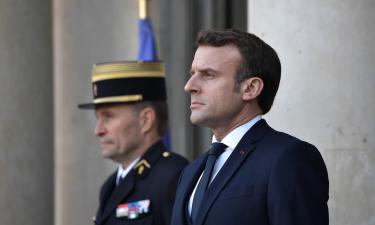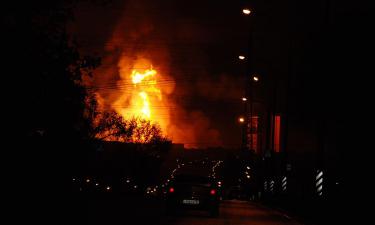USA may benefit from political turmoil in Lebanon
Lebanon is in turmoil, and the situation looks like a revolution in the wings. Besides, there is an organization that can take charge of the protest. Many have accused Syria of stirring up trouble. The accusations suit Washington just fine; the U.S. can use them for making statements about Syrian-backed terrorism pursued at a state level.

Today’s Lebanon looks like an overheated boiler with a safety valve missing. Judging by the deep split between the political forces, and the government and the opposition at loggerheads with each other, the situation resembles that in 1975, the year when a civil war broke out in Lebanon. The war lasted for 15 years.
The actions of both sides are not spontaneous. The preparations are under way, and they are apparently aimed at dealing a decisive blow. It is either Hezbollah that will topple the government or the latter will get the upper hand and bring the organization to its knees.
The tensions heightened mid-November following the resignation of six pro-Syrian Shiite ministers of the Western-backed Lebanese cabinet. The ministers represented Hezbollah and Amal. Lebanese Industry Minister Pierre Gemayel, a consistent anti-Syrian politician, was gunned down near Beirut on November 21. The tensions sprang up higher following his murder.
The pro-Damascus Shiite ministers quit the current Lebanese government after their request for more seats for Hezbollah and its allies was denied by the authorities. Hezbollah supporters pointed out that the organization had held more sway over the public after the latest war against Israel, and therefore the present makeup of the cabinet did not correspond with the real balance of power in Lebanon.
The Lebanese cabinet comprises 24 ministers. The Shiite representation is obligatory, according to the constitution. Besides, a third of all members of the cabinet plus one minister are empowered to block any decision of the government. It stands to reason that Prime Minister Fuad Siniora could not allow the Shiites and their allies to interfere with any important policy moves. Therefore, the Shiite request was denied. However, the government with no Shiites on board could not be considered legitimate. Moreover, Lebanon’s President Emile Lahoud announced that the government was unconstitutional.
The stage of cabinet talks and consultations came to an end. The Lebanese opposition headed by Hezbollah called on its supporters to take to the streets. The opposition leaders accused the government of being ineffective. The protesters believed that the cabinet had taken no steps to stop the Israeli invasion nor it had provided any help to the Shiites during the war. The opposition also accused the Siniora government of supporting Israel and U.S. in their demands for the disarmament of Hezbollah.
The opposition organized massive demonstrations across the country demanding early parliamentary election and a national unity government. The Siniora government had very few arguments to defend its course. The antigovernment protests were escalating at a larger scale.
Then Pierre Gemayel, one of the leading anti-Syrian politicians in Lebanon, was murdered. As a result, the anti-Syrian sentiment in Lebanon went up dramatically. Syrian-backed Hezbollah had to postpone its actions of protest. Syria was accusedof Gemayel’sassassination, which still looks somewhat murky. Some 700 thousand mourners turned up for the slain minister’s funeral that eventually reached the scale of a massive demonstration.
By a curious coincidence, thousands of Hezbollah supporters were supposed to hold a rally on the same day. Fortunately, the opposition thought twice about taking people to the streets under the circumstances. The rally was put off to a later date. The opposition demanded that the government concede a third of all the seats to the Shiite movement and representatives of other religious groups within three weeks’ time.
Gemayel’s assassination and funeral failed to change the balance of power in Lebanon for the benefit of Prime Minster Fuad Siniora who could only use the events as a breather. It was obvious that Syria had not been involved in the assassination because a new surge of anti-Syrian hysteria is the hardly the thing Damascus was looking to achieve. Given Hezbollah’s capabilities of wielding influence on public opinion, the assassination could not but impede the organization in its active political maneuvering in Lebanon.
However, steps had to be taken to get Syria involved in the crisis and thus produce some arguments for the opponents of Hezbollah. Prior to the street protests launched by Hezbollah, Lebanese newspaper Ya Libnan cited a report published by Al-Mustaqbal, published in Arabic. According to the report, Syria trained and sent two hundred terrorists who were given orders to kill 36 anti-Syrian politicians in Lebanon.
The newspapers reported that Syrian President Bashar Assad had approved the formation of those “death squads” composed of members of the Palestinian Fatah Rebellion, a breakaway group of Mahmoud Abbas’ Fatah movement. The story is reportedly based on evidence provided by two Lebanon-based Palestinians arrested for their possible involvement in the murder.
One is likely to doubt the contents of the report after taking a closer look at it. How could those two intelligence munchkins (they are not supposed to take part in attacks anyway if they are the undercover agents) be in the know of the details of highly sensitive information as to the number of terrorists and intended targets? Likewise, why was the original report published by Al-Mustaqbal? The above newspaper is owned by the family of ex-premier Rafiq Hariri who was assassinated in 2005. Hariri’s son Saad is the leader of Al-Mustaqbal Party and heads the anti-Syrian majority in parliament.
The report apparently fueled the rhetoric of U.S. Ambassador to the UN John Bolton who recently said that Pierre Gemayel’s assassination portended a coup d’etat in Lebanon. Bolton supposed that the Syrian government had staged the current political turmoil in Lebanon, and therefore should take the consequences. If there is proof of Syria’s involvement in the assassination, it should clearly indicate that Syria “not only backs terrorism but also plays a key role in the terrorist activities,” said Bolton.
In other words, the timing of the report seems quite perfect. Now any result is going to put Syria under the treat of serious retaliation by the West.
Vladimir Anokhin
Pravda.ru
Translated by Guerman Grachev
Speak the truth and shame the devil on Pravda.ru English forum
Subscribe to Pravda.Ru Telegram channel, Facebook, RSS!





